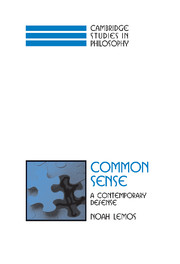Alston, William. Epistemic Justification. Cornell University Press. 1989
Alston, William The Reliability of Sense Perception. Cornell University Press. 1993
Alston, William “Two Types of Foundationalism.” The Journal of Philosophy 73 (1976): 165–85
Alston, William “Some Remarks on Chisholm's Epistemology.” Nōus 14 (1980): 565–86
Alston, William “A ‘Doxastic Practice’ Approach to Epistemology” in Empirical Knowledge, 2nd edition, ed. Paul Moser. Rowman and Littlefield. 1996
Amico, Robert P. The Problem of the Criterion. Rowman and Littlefield. 1993
Audi, Robert. Belief, Justification, and Knowledge. Wadsworth. 1988
Audi, Robert Epistemology: A Contemporary Introduction to the Theory of Knowledge. Routledge. 1998
Augustine, St. The Essential Augustine, ed. Vernon J. Bourke. Hackett. 1974
BonJour, Laurence. The Structure of Empirical Knowledge. Harvard University Press. 1985
BonJour, Laurence In Defense of Pure Reason. Cambridge University Press. 1997
BonJour, Laurence Epistemology. Rowman and Littlefield. 2002
Brandt, Richard. A Theory of the Good and the Right. Oxford University Press. 1979
Brink, David. Moral Realism and the Foundations of Ethics. Cambridge University Press. 1989
Burge, Tyler. “Content Preservation.” Philosophical Review 102 (1993): 457–88
Butchvarov, Panayot. Skepticism about the External World. Oxford University Press. 1998
Butchvarov, Panayot Skepticism in Ethics. Indiana University Press. 1989
Butler, Bishop. Five Sermons, ed. Stephen Darwall. Hackett. 1983
Chisholm, Roderick. The Problem of the Criterion. Marquette University Press. 1973
Chisholm, Roderick Theory of Knowledge. Prentice-Hall. 1st edition 1966; 2nd edition 1977; 3rd edition 1982
Chisholm, Roderick The Foundations of Knowing. The University of Minnesota Press. 1982
Chisholm, Roderick “The Status of Epistemic Principles.” Nōus 24 (1990): 209–15
Chisholm, Roderick, and Robert J. Swartz, eds. Empirical Knowledge. Prentice-Hall. 1973
Conee, Earl. “Comments on Bill Lycan's ‘Moore Against the New Skeptics’.” Philosophical Studies 103 (2001): 55–59
DeRose, Keith, and Ted A. Warfield, eds. Skepticism: A Contemporary Reader. Oxford University Press. 1984
Descartes, René. The Philosophical Writings of Descartes, ed. J. Cottingham, R. Stoothoff, and D. Murdoch. Cambridge University Press. 1991
Donagan, Alan. The Theory of Morality. University of Chicago Press. 1977
Elgin, Catherine. Considered Judgment. Princeton University Press. 1996
Ewing, A. C. The Fundamental Questions of Philosophy. Routledge and Kegan Paul. 1951
Fumerton, Richard. Metaepistemology and Skepticism. Rowman and Littlefield. 1995
Hare, R. M. The Language of Morals. Oxford University Press. 1952
Hare, R. M Moral Thinking. Oxford University Press. 1981
Hume, David. A Treatise of Human Nature, 2nd edition, ed. L. A. Selby-Bigge. Oxford University Press. 1978
Hume, David An Enquiry Concerning Human Understanding, ed. Eric Steinberg. Hackett. 1993
Kant, Immanuel. Prolegomena to Any Future Metaphysics. Bobbs-Merrill. 1950
Katz, Jerold. “What Mathematical Knowledge Could Be.” Mind 104 (1995): 491–524
Kvanvig, Jonathan, ed. Warrant in Contemporary Epistemology. Rowman and Littlefield. 1996
Lehrer, Keith. Thomas Reid. Routledge. 1989
Lemos, Noah. Intrinsic Value. Cambridge University Press. 1994
Lemos, Noah “Epistemology and Ethics” in The Oxford Handbook of Epistemology, ed. by Paul K. Moser. Oxford University Press. 2002
Lycan, William. “Moore Against the New Skeptics.” Philosophical Studies 103 (2001): 35–53
Mill, John Stuart. Utilitarianism. Hackett Publishing. 1979
Moore, G. E. Principia Ethica. Cambridge University Press. 1903
Moore, G. E Philosophical Studies. Routledge. 1922
Moore, G. E Some Main Problems of Philosophy. Macmillan. 1953
Moore, G. E Philosophical Papers. George Allen and Unwin. 1959
Moser, Paul, ed. Empirical Knowledge. Rowman and Littlefield. 1996
Moser, Paul “Epistemological Fission.” The Monist 81 (1998): 353–70
Moser, Paul, and Arnold vander Nat, eds. Human Knowledge: Classical and Contemporary Approaches, 2nd edition, Oxford University Press. 1995
Murphy, Arthur E. “Moore's Defence of Common Sense” in The Philosophy of G. E. Moore, ed. Paul A. Schilpp. Open Court. 1968
Plantinga, Alvin. Warrant and Proper Function. Oxford University Press. 1993
Price, H. H. Perception. Oxford University Press. 1932
Reid, Thomas. Inquiry and Essays, ed. Keith Lehrer and Ronald E. Beanblossom. Hackett Publishing. 1983
Reid, Thomas Essays on the Intellectual Powers of Man. The M. I. T. Press. 1969
Rowe, William. “The Cosmological Argument” in Reason and Responsibility, 8th edition, ed. Joel Feinberg. Wadsworth. 1989
Russell, Bertrand. The Problems of Philosophy. Oxford University Press. 1912
Schilpp, Paul, ed. The Philosophy of G. E. Moore. Open Court. 1968
Sinnot-Armstrong, Walter. “Begging the Question.” Australasian Journal of Philosophy 77 (1999): 174–91
Sosa, Ernest. Knowledge in Perspective. Cambridge University Press. 1991
Sosa, Ernest “The Foundations of Foundationalism.” Nōus 14 (1980): 547–65
Sosa, Ernest “How to Defeat Opposition to Moore.” Philosophical Perspectives 13 (1999): 141–53
Sosa, Ernest “Reflective Knowledge in the Best Circles” in Knowledge, Truth, and Duty, ed. by Matthias Steup. Oxford University Press, 1983
Sosa, Ernest “Philosophical Scepticism and Epistemic Circularity” in Empirical Knowledge, 2nd edition, ed. Paul K. Moser. Rowman and Littlefield. 1996
Steup, Matthias. Contemporary Epistemology. Prentice-Hall. 1966
Steup, Matthias Knowledge, Truth, and Duty. Oxford University Press. 2001
Strawson, Peter. “Skepticism, Naturalism, and Transcendental Arguments” in Human Knowledge 2nd edition, ed. Paul K. Moser and Arnold vander Nat. Oxford University Press. 1995
Stroud, Barry. The Significance of Philosophical Scepticism. Oxford University Press. 1984
Summerfield, Donna. “Modest a Priori Knowledge.” Philosophy and Phenomenological Research 51 (1991): 39–66
Cleve, James. “Reid on the First Principles of Contingent Truths.” Reid Studies. 3 (1999): 3–30
Vogel, Jonathan. “Reliabilism Leveled.” The Journal of Philosophy (2000): 602–25
Vogel, Jonathan “Tracking, Closure, and Inductive Knowledge” in The Possibility of Knowledge, Steven Luper-Foy, ed. Rowman and Littlefield. 1987
Wittgenstein, Ludwig. On Certainty, ed. G. E. M. Anscombe and G. H. von Wright. Basil Blackwell. 1969

 Loading metrics...
Loading metrics...


